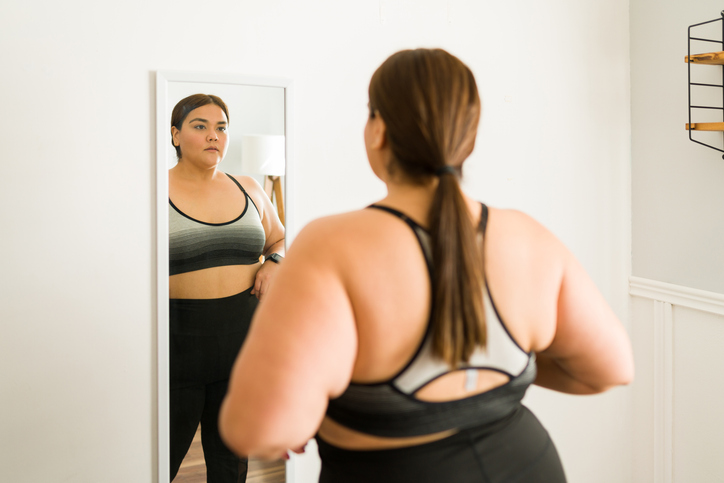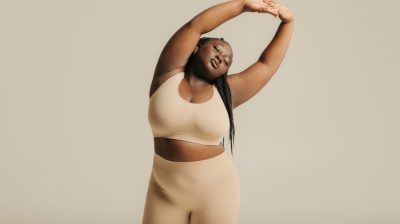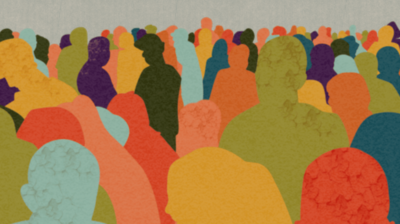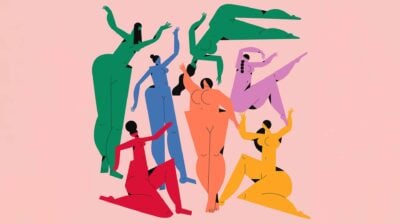What can affect your body image?
Learn more about the factors affecting body image, from culture and social media to unhelpful social comparisons.

Many different factors can influence how you perceive and feel about your body. These factors can vary from person to person, and they often interact in complex ways. For example, cultural standards of beauty, social media influences, life experiences, and even your relationships can all play a significant role in shaping your body image. Understanding these influences is essential, as they can help identify the sources of your feelings and judgements about your bodies.
In this article, you will find information on the following factors that can affect a person’s view of their own body:
Culture
Distorted body image
Body dysmorphia
Puberty
Family values and attitudes
Social comparison
Factors affecting body image
Below are some important factors that can affect how you feel about and judge your body.
Culture
Culture plays a significant role in shaping your view of your body, particularly through societal messages about beauty and desirability. Societies can promote certain messages about how bodies should look or behave. When you internalise these messages, you may begin to believe they are true, and this can affect how you feel about your body and self-worth. For example, if you absorb the belief that certain body types are more acceptable or attractive, you may begin to measure your worth against these standards. This can lead to greater dissatisfaction with your body if you feel you don’t fit the “ideal” body image.
The cultural messaging you hear can result in either acceptance or rejection of your body. Since your body is a fundamental part of your identity, this acceptance or rejection can represent a broader acceptance or rejection of who you are. That’s why working to improve your self-esteem can protect against the negative impact of harmful cultural messaging. Doing so can help you develop a more positive body image and a stronger sense of self-worth.
Distorted body image
Body distortion or having a distorted body image refers to the tendency to perceive your body in ways that differ from reality. When your perceptions become distorted, you are more vulnerable to feelings of body dissatisfaction. Body dissatisfaction is one of the main risk factors for developing an eating disorder. However, not everyone who has a distorted body image or experiences body dissatisfaction develops an eating disorder.
Body dysmorphia
Having a distorted body image is different from having body dysmorphia or body dysmorphic disorder (BDD). BDD is a mental health condition where a person becomes fixated on perceived flaws in their appearance. People with BDD tend to become fixated on a specific body part or what they view as a specific defect in their appearance. By contrast, people who have a distorted body image are often concerned about weight or their overall body size. People with BDD tend to have obsessive thoughts about their perceived defect(s), leading them to engage in excessive mirror checking, grooming, and other repetitive behaviours. BDD often leads to high levels of emotional distress. This is because having overly critical views of your body can significantly impact your self-esteem and overall emotional well-being. You can learn more about BDD on the Bodywhys website.
If you find it difficult to stop thinking about your body’s flaws, you may benefit from speaking to a professional support. Speaking to a counsellor or psychotherapist may help you explore why you might be having these self-critical thoughts and feelings so frequently. Practising self-compassion can also help with challenging negative, inaccurate views of ourselves and building a more positive body image.
Puberty
During puberty, the changes in your body can greatly impact how you view and relate to yourself. As bodies grow and develop, feelings of anxiety and distress can arise, leading some to feel disconnected from your changing appearance. Comparing your own body changes to those around you can intensify these feelings. You may also feel social pressures to conform to specific body types or appearances, making it difficult to feel comfortable in your own skin. Facing these changes while balancing schoolwork and social expectations can be challenging for many people.
It can help to talk to someone you trust about how you are feeling during this time. Many people experience these challenging feelings about bodily changes during puberty and at other times of change or transition in life. Change is normal and expected throughout life; how you feel in your body can change from day to day, and even from minute to minute. It is possible to build coping skills and find strategies to support your mental health during these difficult times.
Family values and attitudes
Family values and attitudes play a big role in shaping how you perceive your body. The messages you receive from caregivers and family members about physical appearance and health can significantly influence your own body image. For example, if members of your family value being thin or criticise certain body types, you may feel pressure to conform to that ideal body type.
Early life trauma, whether it occurs within the family or in other contexts, can deeply impact your relationship with your body. Research shows that people who have experienced trauma often struggle with interoception, which is the ability to sense internal bodily signals, such as hunger or needing to use the toilet. When someone has difficulty tuning into these bodily sensations or actively avoids them due to traumatic memories, it can create a feeling of disconnection from their body. Feeling disconnected from your body can lead to challenges in accepting yourself, as well as building a positive view of what your body looks like and how it functions.
With appropriate treatment or support, it is possible to develop a greater understanding of and connection with your bodily signals.
Social comparison
Social comparison is the process of judging yourself in relation to others. People make social comparisons both online and in person. Often, you may not even realise you are doing it, as it may be a natural way to gather information about your social environment and understand your place within it. You might compare yourself to friends, peers, acquaintances, or even family members. When making these judgements, you may compare yourself to other people’s physical appearance, personality traits or types of careers.
While some social comparisons can motivate you and help you grow, others may lead to feelings of inadequacy and negatively impact your body image and self-esteem. It’s important to be aware of how these comparisons affect your perception of yourself and your body.
Unhelpful social comparisons
Online and on social media, you may often come across airbrushed and filtered images of people and celebrities. Offline, you might find yourself comparing your body to the bodies of people who have undergone cosmetic procedures or made significant physical changes. Seeing and internalising unrealistic standards of beauty can have an impact on how you view your own body, even when recognising that these standards are not realistic.
Helpful social comparisons
Social comparisons can also be beneficial. Depending on the context, you might use comparisons to learn from others, gather valuable insights about our social environment, and even support a positive body image. For example, you might protect your positive body image by focusing on what you like about your body when you’re around body types that tend to make you feel insecure. Being more accepting of diverse body types can also help us to be more accepting of our own unique body.
Recognising the impact of our social comparisons on our body image can help us navigate our relationships with ourselves and others more mindfully. You can find more information on body image and support by visiting the Bodywhys website. Read more about how to improve your body image.
Feeling overwhelmed and want to talk to someone?
- Get anonymous support 24/7 with our text message support service
- Connect with a trained volunteer who will listen to you, and help you to move forward feeling better
- Whatsapp us now or free-text SPUNOUT to 50808 to begin.
- Find out more about our text message support service
If you are a customer of the 48 or An Post network or cannot get through using the ‘50808’ short code please text HELLO to 086 1800 280 (standard message rates may apply). Some smaller networks do not support short codes like ‘50808’.






